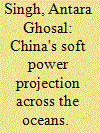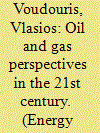| Srl | Item |
| 1 |
ID:
125931


|
|
|
|
|
| Publication |
2013.
|
| Summary/Abstract |
With jobs disappearing across the developed world and arriving too slowly to keep pace with the population growth and aspirations of the developing world, the very nature of work is being challenged as never before. We asked our panel of global experts what they see as the most effective and expeditious way of creating jobs.
|
|
|
|
|
|
|
|
|
|
|
|
|
|
|
|
| 2 |
ID:
147401


|
|
|
|
|
| Summary/Abstract |
At a time when the focus of most of the academic research on China is on the geopolitical developments in the South China Sea and the panning out of the United States' “next phase of rebalance strategy” in Asia, this paper draws attention to China's charm offensive across the Atlantic. It explores the political undertones of China's soft power push in the developed western world, especially in the context of its evolving relationship with the United States. In the final section, the paper tracks the implication of these developments on India and Indian policymaking.
|
|
|
|
|
|
|
|
|
|
|
|
|
|
|
|
| 3 |
ID:
126799


|
|
|
|
|
| Publication |
2014.
|
| Summary/Abstract |
Forty years ago, the world experienced the "first oil shock". Back then the world had just ended a period of strong economic growth in the developed world, with rising US oil imports, and began a period of turbulence in the price of oil and for many national economies. Back then (as now) it was recognised that oil price rises might snuff out economic recovery. Drawing on the names of the scenarios which Shell's planners introduced at that time, we were passing through "The Rapids" and about to enter a "World of Internal Contradictions", in recent years there have again been many indicators of a "World of Internal Contradictions". and with the financial crisis and turbulence in oil markets those of "The Rapids" too. This issue is therefore timely, as many of those earlier challenges are still with us.
|
|
|
|
|
|
|
|
|
|
|
|
|
|
|
|
| 4 |
ID:
090919


|
|
|
|
|
| Publication |
2009.
|
| Summary/Abstract |
This article presents a cross-country comparison of the intensity of revolutionary terrorism in the developed world after the wave of mobilization in the late 1960s and early 1970s. Some countries were hit much more severely than others by this type of violence. The article tries to account for this variation with a new dataset of fatalities in 23 countries, for the period 1970-2000, based on local sources in six different languages. This dataset corrects in part the problems of underreporting that Jan Oskar Engene's TWEED dataset suffers from. The dependent variable is a novel index of the intensity of terrorism that combines the number of fatalities and the number of years in which the terrorist organization has killed people. The unit of analysis is the country in the whole period. Six broad hypotheses about the influence of economic development, social change, mobilization, welfare provision, population and political factors are tested in the article. The statistical results show that three variables are almost sufficient to explain variance: past dictatorship, high population and strong communist parties. Given that past dictatorship is the most important variable, three different mechanisms by which to understand its effect are suggested: the role of repression in countries with past political instability; dictatorship as a proxy for polarization; and past breakdowns as an indicator of the chances of overthrowing the system.
|
|
|
|
|
|
|
|
|
|
|
|
|
|
|
|